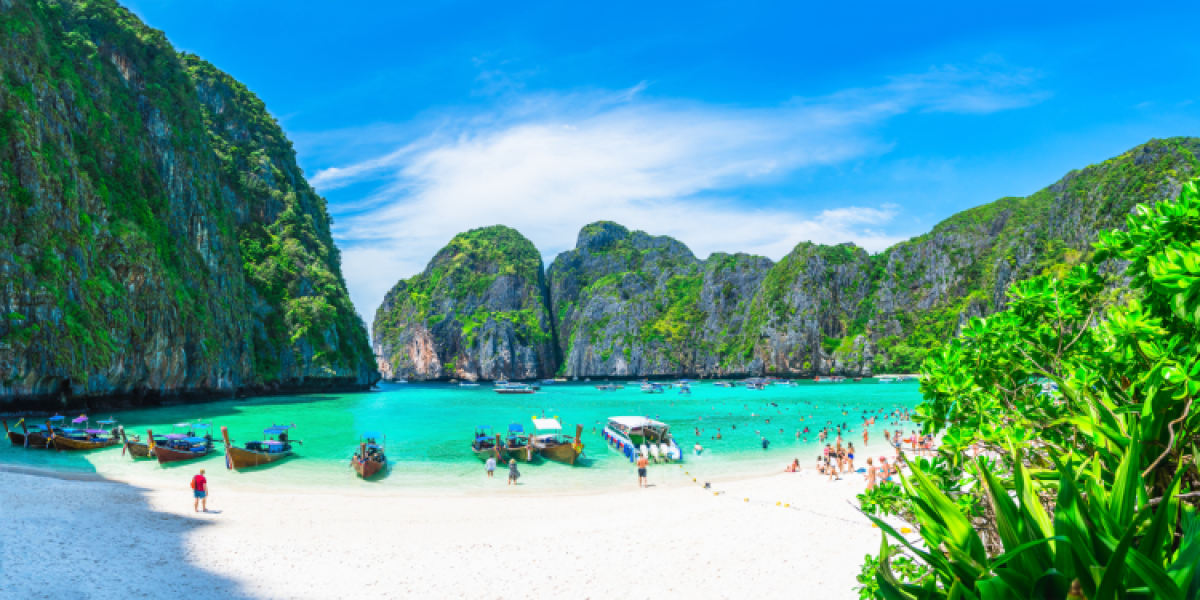
Thailand has been hard hit by the economic crisis brought by the pandemic. Still, to trigger growth, the country looks determined to get back on track, first by containing the pandemic and then by bringing back foreigners. Current results are encouraging. The contamination rate has gone down, and vaccinated foreigners are now allowed into the main Thai tourist spots.
The border reopening program
Named the "Phuket Sandbox 7 + 7 Extension", the border reopening program was launched in August. Thanks to the “Phuket Sandbox 7 + 7”, fully vaccinated foreigners are now allowed to travel to the island of Phuket. Through the experimental phase, more than 29,000 fully vaccinated international travellers were allowed to stay in Phuket. According to Thanakorn Wangboonkongchana, a government spokesman, the feedback is great. Foreign visitors were happy to discover the island, while locals were reassured of economic revival. The reopening generated some $ 50 million. Currently, the government is reopening other territories, namely Surat Thani, Krabi, and Phang-Nga. Bangkok and three other provinces were supposed to reopen in October, but they won't for now due to the high number of Covid-19 cases. So Bangkok should be more accessible in November. Considering the economic risks, Thailand prefers to remain cautious.
During the early days of the pandemic, Thailand could claim to be Covid-free, but this did not last for long, unfortunately. But the country is making significant efforts in terms of safety to attract international travellers. Thanks to effective anti-Covid-19 measures. Thailand has recovered from a peak seen in August - with more than 20,000 new cases. The number of new cases is falling (there were only 10,919 cases on September 21). As of September 20, 21.7% of the population is fully vaccinated; 41.1% received at least one dose. But to trigger growth, flawless management of the health crisis is required, and this is why Thailand opted for targeted and controlled reopening. Only fully vaccinated foreigners and those who commit to undergoing regular PCR tests are allowed to stay in specific areas. However, the total reopening is not expected until 2022.
Appeal to wealthy expats
There is good news for expats and people who are looking for new career prospects in Thailand. Finance, information technology, commerce, electronics, engineering, and manufacturing are some industries that are doing well and are hiring. But on September 14, the government spokesperson announced that Thailand was endorsing “economic stimulation and investment” measures to attract “wealthy foreigners” or “foreigners with high potential”. This proposal was launched last June and will soon be implemented. The government's intentions are clear: to attract wealthy expatriates who are classified into four categories: the wealthy, retirees receiving a pension, expats wishing to work in Thailand (especially remote workers), and highly qualified professionals.
The government is planning tax reductions, visa extensions, including the possibility of obtaining a 10-year visa, and to simplify measures relating to property investment. The government hopes to attract some 1 million expatriates and generate more than $ 15 billion through taxes alone, even with the reductions.
Meanwhile, expatriates would commit to investing in the local economy. Here again, the government has precise figures. Wealthy expatriates are expected to make a minimum of $ 500,000 investment in the Thai economy. In return, expatriates could be exempted from the work permit requirement to work for 20 hours a week). Moreover, their income would be tax-exempt. Retirees are expected to invest at least $ 250,000. Digital nomads and highly qualified professionals will have to work for companies with a large turnover or reputable institutions (universities, research organizations, etc.).
In line with its reopening policy, Thailand has launched its e-visa to look more appealing to expatriates. Procedures have been simplified can be done entirely online for greater flexibility. For the wealthy expatriates, the procedures could be more straightforward with the 10-year visa. Still, many feel left out by the Thai authorities, pointing out that not all expatriates are wealthy and/or highly qualified. It's therefore clear, for them, that distinction is being made between “Western expatriates” and “migrant workers”. Expatriates who are already in Thailand talk about restrictive visa renewal procedures and feel neglected by the authorities. You will recall that the crisis has destroyed nearly 700,000 expat jobs held by expatriates, mainly in highly affected sectors such as tourism, catering, leisure, etc. But it's uncertain whether the government will take their demands into account.
Thailand has been one of the most popular expat destinations for many years, thanks to its living environment, low cost of living, and investments in new technologies. But only time will tell if expatriates will respond to the government's appeal.



















